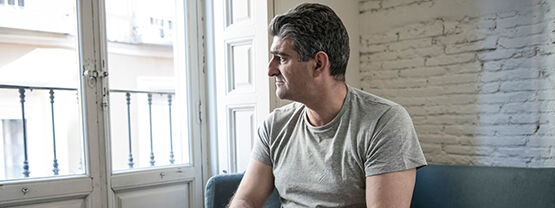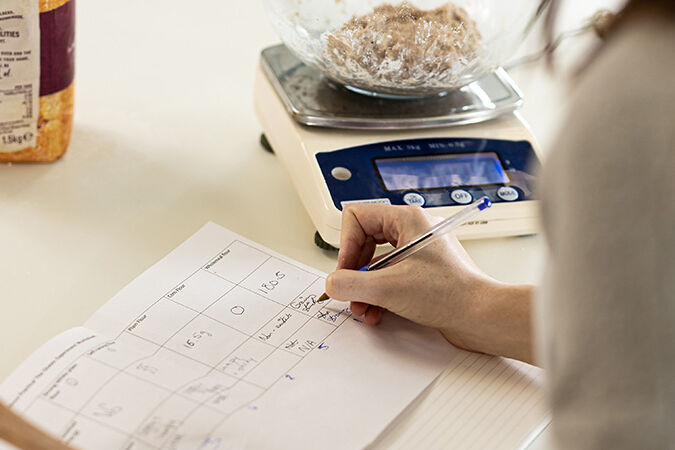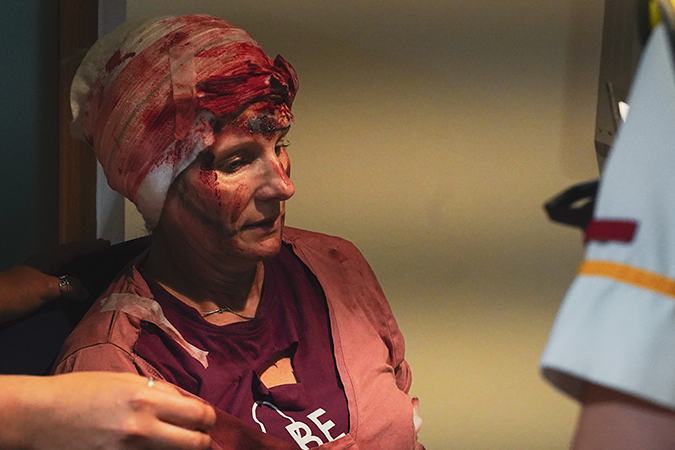Domestic abuse is a massive problem in the UK - between March 2016 and March 2017, 1.2 million women experienced domestic abuse and it’s estimated that 4.3 million women aged between 16-59 have experienced domestic abuse.
Typically, two women in England and Wales are killed each week by their partners/ex-partners, with an average of 100 calls to the police every hour relating to incidents of domestic abuse (Office for National Statistics, 2017). It’s likely that a significant percentage of the population will experience domestic abuse or will know someone who has been affected by it.
The following blog is written by one of our Speech and Language Therapy students:
I am a 37 year old single mother of three children with special needs; Melody (10), Ashlynn (seven) and Logan (five). I graduated from University in 2002 with a 2:1 in English and went on to train as a journalist, gaining my NCTJ qualification in 2003. I am passionate about communication needs and have just started the second year of the Speech and Language Therapy degree at BCU.
The coercive controller
Three years ago, if I had been asked to describe an abusive relationship, my response would not have been the same as today. The media is dominated by descriptions of rage fuelled people who beat and rape their partners, lock them in the house and forcibly take their money. My own experiences told me to be on the lookout for rapists and wife-beaters but nobody ever mentioned the coercive controller.
I spent 17 years in a relationship without even realising I was being abused until I was plunged into a state of depression. Even then I didn’t link the relationship to my mental health because I wasn’t aware of the many different presentations of abuse. I’d heard of ‘domestic violence’ and read stories about people being viciously beaten, raped and murdered by their partners. These terrible stories were what came to mind when I thought of domestic violence/abuse but they are not the only form of domestic abuse.
The Birmingham Freedom Project
There’s a set list of questions which agencies are told to ask when they think somebody might be in an abusive relationship, but there needs to be more than a check list to effectively identify abuse. If I had been handed one of those questionnaires to fill in by myself, I would probably still be in an abusive relationship now because the questions are so rigid.
I was lucky because the facilitators of the Birmingham Freedom Project took the time to explain each question and give examples of what they meant. At the time I wouldn’t have thought I needed the questions to be explained – they don’t seem to be difficult and I don’t believe I lack intelligence, but this is part of the problem.
Am I a victim?
One day I was asked if I was a victim of ‘domestic violence’ but the word ‘violence’ always threw me off; I wasn’t being beaten, so I couldn’t have been, could I? I was asked if my partner stopped me accessing money or physically stopped me leaving the house. The answer to all of these questions was simply ‘no’ and that’s why I want to raise awareness of domestic abuse in all of its forms.
Too often identifying abuse comes down to a check list of very specific questions which require a yes or no answer. Sometimes things aren’t that simple. I had access to money, but our finances were always kept separate. My money had to pay all the bills, buy all the food and pay for everything the kids needed, which was a struggle. His money was his. He did what he wanted with it, but it never benefited me or the kids. Now I know this was also a form of abuse; by keeping his money to himself he made sure my money had to be spent on the essentials. It meant he knew what my money was being spent on and that I had no money to do anything for myself. He didn’t stop me from going out, but how could I go out with no money? Even on the rare occasions when the opportunity to go out came up, the fun would be sucked out of it. My partner would tell the kids that I was going out to get away from them. I would reassure them that wasn’t the case, but the seed of doubt had been planted and the damage had already been done.

Living in isolation
I’ve heard many stories of people being isolated from friends and family and knew this was a key aspect of domestic abuse. This isolation doesn’t have to be caused by a partner not allowing you to contact people and this is something I didn’t understand. I knew if friends or family wanted to visit me, there was nothing to stop them, so how could my partner be isolating me? The reality is that although people were ‘allowed’ to visit, they very rarely did because the very thought of having someone visit threw me into a state of panic.
I knew exactly how it would play out: my partner would quickly start grinding his teeth and contorting his face, with the vein in his temple throbbing. Guests would notice; how could they not? For some, his body language was enough to drive them away but for those who stayed, the misery was just getting started. You see, my partner was very clever and manipulative and adapted his technique to suit the individual. He would engage people in conversation just long enough to find out how to rile them up and then he would steer the conversation in the direction of the sensitive topic. He would always adopt the opinion/attitude the other person found offensive; regardless of whether he truly held those beliefs. Of course, the conversation would quickly turn into an argument and the visitors were never in a rush to return. Just in case anyone wanted to come back, I always had an excuse ready to keep them away. The ensuing misery was too high a price to pay for company, but if I was the one putting people off I didn’t see how it could be my partner’s fault. Instead, I believed the anxiety I experienced anytime someone wanted to visit us or asked us to visit them was indicative of social anxiety disorder. In reality they were normal responses to an abnormal set of circumstances.
Independence slipping away
There are many ways in which the widely held image of domestic abuse can vary from reality. I’m sure most people would think an abuser wouldn’t do any of the household chores and this is exactly what I thought. This is another reason it took me so long to realise my relationship was abusive because my partner had no problem cooking and cleaning. In fact, he did all of the cooking and cleaning because strangely enough, he didn’t like me to do anything. My job was to ‘play with the kids’, nothing more, nothing less. He would actually get upset if I tried to do anything else. If I bathed the children or even changed their nappies, I was pushing him out and making him ‘redundant’. If I was doing the ironing in the kitchen he believed that meant I was trying to get away from him. Why else did I want to be in a different room to him? The thing is, I was never told I couldn’t do any of these things but his moods whenever I did were too much to take.
Eventually, I stopped trying and my independence slipped away, which I now know was his plan all along. If I depended on him for everything, how could I ever leave? He was making himself indispensable and the longer this went on, the more I felt I wouldn’t be able to cope without him. I was well and truly stuck but how could I complain? What could I say? My partner cooks, cleans, changes nappies and I don’t have to do anything? Then everyone would know I was as useless as I felt, so I kept it to myself and complied with everything he asked. If he sat down to watch television, I knew that I was supposed to sit with him and watch television. I couldn’t sit with him and read a book whilst he watched television – that would be classed as ignoring him. I was supposed to do everything he did so if he went to bed, I knew I was supposed to go to bed and if he stayed up late, I was supposed to stay up late.
There was very little opportunity for me to be away from him, as he insisted on doing everything together. Even the mundane food shopping had to be done together because if I ever made a purchase without consulting him first, I knew there would be a price to pay. I would be accused of not considering his opinions or involving him and he would sulk for days. Of course, with him going everywhere with me, there were no opportunities for me to talk to anyone except him.

Different signs of abuse
Some abusive relationships can be easier to spot than others – if, for example, a co-worker repeatedly turns up to work with bruises, you would probably suspect they were being abused. If, however, a co-worker frequently turns up to work subdued and appears to be depressed, you wouldn’t automatically assume they were the victim of domestic abuse. Similarly, there tends to be a greater understanding of the reasons for remaining in a violent relationship than there is for someone staying in a relationship with a coercive controller. After all, it’s obvious that someone would be scared of violence but you wouldn’t automatically equate coercive control with fear. In fact, we are introduced to the adage ‘sticks and stones may break my bones, but names will never hurt me’ as children and this belief stays with us. The truth is physical violence and emotional abuse are just as damaging as each other. Just because you can’t see the damage, doesn’t mean it doesn’t exist and you can be just as scared of the constant torrents of verbal abuse as you can of a physical attack.
Eventually, you get to a point where everything you do is done with trepidation; you are walking on eggshells and you are no longer capable of making decisions. I know because after 17 years in an abusive relationship I didn’t even know what I liked or disliked anymore. I knew what he liked and more importantly what he didn’t. There had only been one way of doing things and only one person’s opinion that mattered during that time and it wasn’t mine. By the end I was too scared to even choose a programme on the television to watch in case he objected because even though I was only too aware of what he liked, he would always be ready to pull the rug out from under me. If he was in a mood, I could put his favourite programme on the television and this would still lead to trouble. He would swear blind that he didn’t like it and spend the whole time shouting at the television. He was really good at convincing me that I was going crazy and my depression was making me lose touch with reality.
My resolution
Jacky and Donna at the Birmingham Freedom Project helped me to understand abuse in all of its forms and to see that my relationship was indeed abusive. With their help and courses I have been able to take back my autonomy. Now I’m a much stronger person and I hope that by speaking out about my experiences, other people can know they are not alone and they don’t have to suffer in silence.
That’s why I agreed to take part in the ‘Dear friend’ project which involved writing a letter of hope and encouragement, which has been read out and filmed by Dr Katherine Perry (Dr Bruce Perry’s daughter). The letter is meant to represent a light at the end of the tunnel for women trapped in abusive relationships, or who feel scared to speak out. There are people out there who will believe you and will help you to take back your power and voice. Remember, love doesn’t hurt and if you feel something isn’t right, listen to your instincts because it probably isn’t.
If you need help or would like to know more about the amazing work the Birmingham Freedom Project do, contact Jacky or Donna on: 07868163103 or email them in confidence. You can also check out their website.





